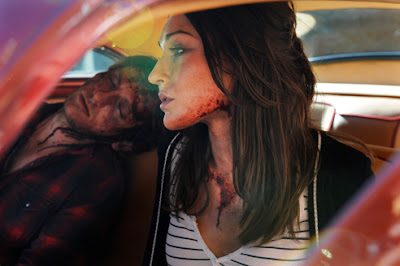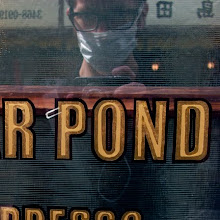* Man From Nowhere (dir. Lee Jung-beom, 2010, Korea)
Exhaustively violent, crime-riddled revenge thriller, in the bruised knuckles universe that produced Park Chan-wook's Oldboy (rather than Ryu Seung-won's hyper-agile taekwondo realm), Man From Nowhere works so well and grips you amid the grueling, rampant fight sequences w/ it's pulsing emotional heart. We care about lead Won Bin, discarding his pretty-boy image for the hardboiled, black-suited Tae-Sik, all seething rage w/ a past to match it. Director Lee's ride begins w/ a typical drug deal gone bad, when a club dancer steals the heroin from the baddies. Her daughter So-Mi is this absolute cutie, all long bangs and impressionable attitude, and they happen to live near Tae-Sik's pawnshop, where mom trades loot for drug money. So-Mi hangs out w/ Tae-Sik to avoid the degradation at home, and though he's reticent he allows her to stay over, where she shows him her nail art and gives him a Magic card (the "dark knight"). The mob, composed of drug-runners and black-market organ stealers (plus this English-speaking psychopath named Ramrowan), track down mom, brutally kill her, then kidnap So-Mi and attempt to kill Tae-Sik. Guess who just messed up big time!! Tae-Sik unleashes a trail of blood and destruction, laying waste to the mobsters whilst avoiding the cops who think he's somehow involved in this drug game. Key point here: Lee fully 3Ds EVERYBODY, from Tae-Sik's own backstory (he's a former secret agent whose pregnant wife was killed, before his eyes, in a devastating car crash) to the detectives to the mobsters' idiosyncrasies. This character development is necessary to keep the film from totally drowning in ultraviolence, b/c there's plenty of that in a daisy-chain of continually one-upped sequences. A particular two-parter: Tae-Sik and Ramrowan brawl in the previously spotless (now blood-streaked) white-tile loo of the club where So-Mi's mom formerly danced, only the guys duke it out in a stall that houses a dead prostitute slumped in the corner. Then, they take the action to the dance floor, staring each other down amid the crowd of gyrating young people and throbbing techno. When Tae-Sik lays waste to the drug lab (which employed young kids like So-Mi, their temp positions before they're killed for organs) and the asymmetric-haired Jong-Suk, the ultimate baddie and brother threatens to remove So-Mi's eyes from her head while she's still alive. That's how far this film takes it. By this point, Tae-Sik has shorn his own floppy, long-banged hair to this sharp cut not entirely unlike a Korean Keanu Reeves from The Matrix, and Korean Neo mercilessly dispatches everybody in ultimate baddie's HQ (like the office lobby scene in The Matrix, only w/ blood). Tae-Sik's rage is unconsolable, thinking So-Mi was tortured and murdered, and maybe he's thinking back to his wife's death, and he won't stop until everyone who's hurt the girl become eviscerated and stone-cold by his hand.
* We Are What We Are (dir. Jorge Michel Grau, 2010, Mexico)
Not your garden-variety flesh-eating-themed horror film. I knew little about it going in besides it centered on a family of cannibals (yes! just what I need! I thought), and I got a very dark, ultimately tragic family drama instead. The old patriarch dies early on, leaving his distraught wife and three teen kids to fend for their food. They live in this dim, cluttered (possibly haunted) house and watch-repair shop, following an incredibly ritualistic routine on human butchering that is revealed in snatches but remains mostly opaque throughout the film, more symbolic than shocking. In fact, the police don't seem too surprised to learn that Dad was a cannibal (they find a human finger in his gullet). The daughter Sabina, coming off as the strongest, fiercest of the family, promotes her elder brother Alfredo to take over the ritual, but he's reluctant and the younger, somewhat sociopathic Julian is ready to murder anybody and picks off a prostitute. Mom goes ballistic when the girl is drug home, claiming Dad's demise was hastened by the many prostitutes he picked up and ultimately murdered, and she beats the girl to death and discards her on the street. They're desperate for food by this point, so Alfredo attempts to deal w/ it himself (while conversely revealing and suppressing his homosexual desires) by picking up a young man at a gay club. Mom, confusingly, sleeps w/ a taxi driver and lures him back home to kill him. The cops inevitably find them and way too many people die in a short period of time, w/ moments of partially-hidden gore before descending into bleakest depravity.
* Never Let Me Go (dir. Mark Romanek, 2010, USA/UK)
I was super-pleased to attend Fantastic Fest's 2nd "secret screening" and learn it to be the bittersweet adaptation of Kazuo Ishiguro's novel, b/c though I knew it had just opened in NY, the festival screening featured Romanek in person for an intro and Q&A, which is always awesome. I'd read a lot of lead-up to the film, how it was beautifully shot (though that's no surprise coming from Romanek) and faithful to the novel, that it's A-list stars (Carey Mulligan as Kathy and Keira Knightley as Ruth, w/ Andrew Garfield as Tommy) don't overpower the story nor mug for the frame. And I understood, too, that in this dystopian near-future England of "carers", "donors" and "originals", the end result would be a serious tearjerker. But it hit much deeper than I expected. Part of it is gnawing reality that these kids understand as they play in the fields around their exclusive boarding school and then emerge in the "real world", knowing that, eventually, when it's their time, they will give their bodies to organ donation surgery, a process that will inevitably kill them. Seeing Kathy, Ruth and Tommy jammed into a diner's booth, unable to even order tea independently of one another, or peering through glass windows at an office staff, may frustrate us as we wonder "why do they accept their fates? These poor sheltered kids, all grown up now, they're willingly leading themselves to their own demises." To say that they accept their fates "elegantly" or "proudly" might not be the appropriate word, but what they DO is love one another, come to terms w/ their multilayered, mutable friendship, and bravely move forward. Bravely, then, might be the word.
* Rubber (dir. Quentin Dupieux, 2010, France)
Award for strangest film of Fantastic Fest goes to Mr. Oizo's idiosyncratic, meta-genre full-length. Think about the premise: a sentient trucker tyre w/ the psychic powers to explode small mammals, scrap metal and human heads, rolling about the scrubland Wild West after a cute girl (Roxanne Medina), while a sheriff cautions us to suspend disbelief (the underlying factor of so many fantasy/genre films) and just go w/ it. He imparts this knowledge by monologuing w/ the camera, and when that pulls away he's monologuing w/ a captive audience in the desert, much like ourselves in the theatre. So we go w/ it, never learning nor really minding HOW Robert (the tyre's name) became equipped w/ independent thought & locomotion, enjoying the wild ride from mostly his rolling POV — interspersed w/ audience chatter and the sheriff's attempts to end the film prematurely — to Dupieux's characteristically dope, bouncy soundtrack (I mean, he did the famous "Flat Beat", recall). On the one hand, I can't quite compare Rubber to ANY film I've seen before, yet it comfortably fits into the genre while neatly critiquing all the standards (if there can be a Christine or a Monkey Shines or, hell, even the Evil Dead, there can be a smart, emotional, vengeful tyre!). One of the spectator's quips about Robert near the very end, "it's not over yet! He reincarnated as a tricycle!" furthers this suspension-of-disbelief notion. Said tricycle, cruising down the roadway alongside Medina's car, followed by various other tyros, into the sunset: it's a beautiful thing.
* The Violent Kind (dirs. The Butcher Brothers, 2010, USA)
I think I dug the Butcher Bros' exhilaratingly drunken goriest a bit TOO much. The fun thing about Fantastic Fest is, though it's chock-full of very, very violent films, they tend to fall into two broad categories: serious, vengeful, disquietingly violent vs. irreverent, jugular-spray, obscene cartoon violence. Which is why I love Yoshihiro Nishimura's oeuvre so much, anchored firmly in that latter category. And after a Saturday of punishingly brutal films, I wanted something soaked in as much PBR tallboys as blood, w/ some of that genre "suspension of disbelief" made explicit in Rubber, and The Violent Kind delivered. Our reward is chatty Tarentino-esque scenes, lots of hot girls, an Exorcism-like possession (only the victim, Michelle, is drenched in raspberry-jam blood), plenty of slasher- and zombie-referential moments, Lynch-ian voyeuristic camera, bikers v. Rockabilly aliens to a slammin' soundtrack, and a good bit of torture-porn, even a sliiiightly Shyamalan-esque doomsday denouement. One attempt to sum up the plot: good guy Cody gets the crap kicked out of him by the Rockabilly aliens, who are seeking the demon possessing his ex-GF Michelle, while they torture Cody's cousin Shade & Michelle's cuter younger sister Megan by wrapping their heads in plastic-wrap. Lead Rocker Vernon, who I swear reminds me of Blake from Queer as Folk (U.S. edition), maintains a pitter-patter dialogue a la Malcolm McDowell in A Clockwork Orange just as he delivers his own ultraviolence. So it's pure shock-coke, a stew of genre ingredients cooked to sizzling effect. I loved it.
skip to main |
skip to sidebar
Twitter
Blog Archive
-
▼
2010
(95)
-
▼
October
(8)
- fee's LIST (through 11/2)
- fee's LIST (through 10/26)
- fee's LIST (through 10/19)
- fee's LIST (through 10/12)
- Parting thoughts on Fantastic Fest 2010
- (my) Fantastic Fest 2010, Thursday: JULIA'S EYES, ...
- (my) Fantastic Fest 2010, Tuesday: MUTANT GIRLS SQ...
- (my) Fantastic Fest 2010, Monday: MAN FROM NOWHERE...
-
▼
October
(8)








.jpg)

